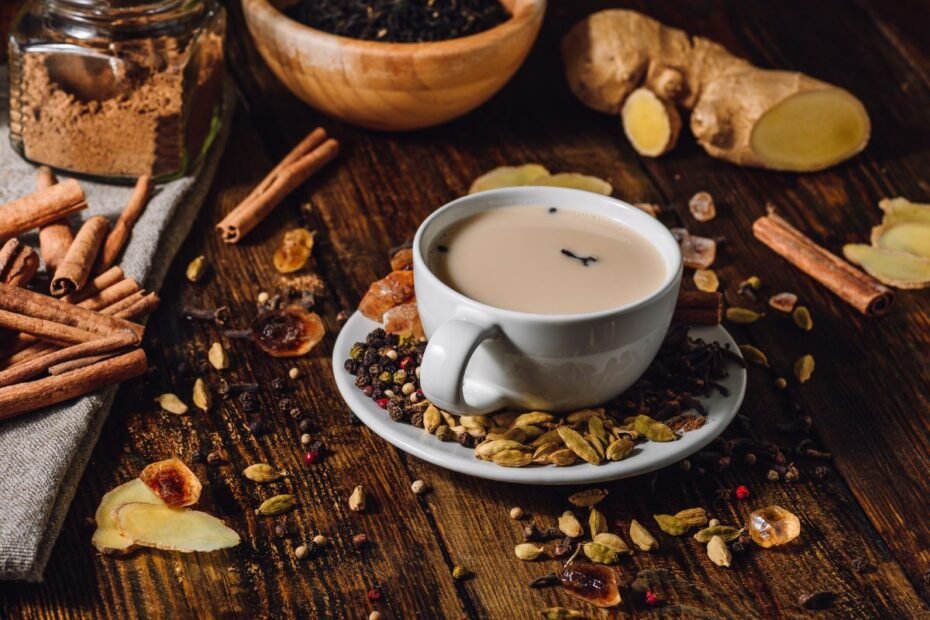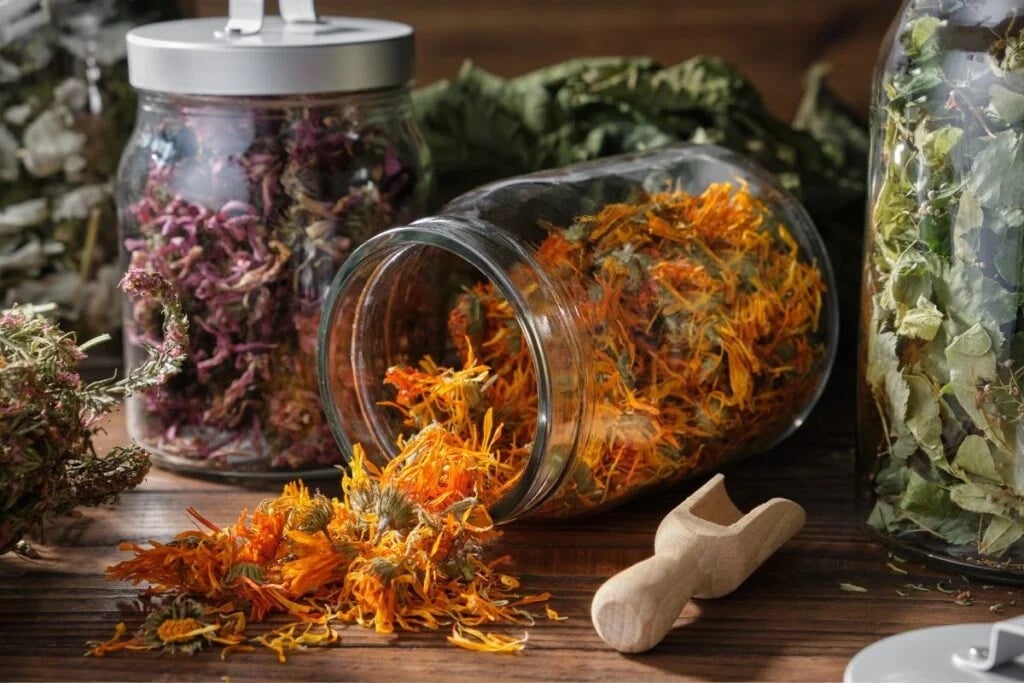One of the most popular tea variations is Chai tea. It has a unique taste, and it’s trendy! It is available in famous-brand cafés and as ready-to-drink blends in many supermarkets. Furthermore, Chai tea benefits will surprise you.
A few words about this drink: it’s a spicy, exotic-tasting black tea with milk. It originated in India and was inspired by British colonists because they loved drinking black tea with milk. Therefore, to prepare traditional spiced Chai, mix black tea with full milk. For example, buffalo or whole cow’s milk and spices such as ginger root, cardamom pods or seeds, cinnamon, star anise, and black peppers are used.
Interestingly, ‘Chai tea’ is pronounced as ‘tea tea.’ A more accurately described word should be ‘Masala Chai,’ which means spiced tea’ in Hindi and represents the essence of this popular drink.
Chai Spices
What we call Chai tea is Masala Chai, a spiced one. Chai spices are a classic blend of hot spices with a distinctive flavor. It includes cardamom, cinnamon, ginger, cloves, black pepper, star anise, and nutmeg. Traditionally, these spices are combined with a black tea base, full-fat milk, and a sweetener, such as unrefined cane sugar, to make a drink.
Focus on the quality of the Chai spices when choosing. When buying a ready-made mix, choose organic and fresh products.
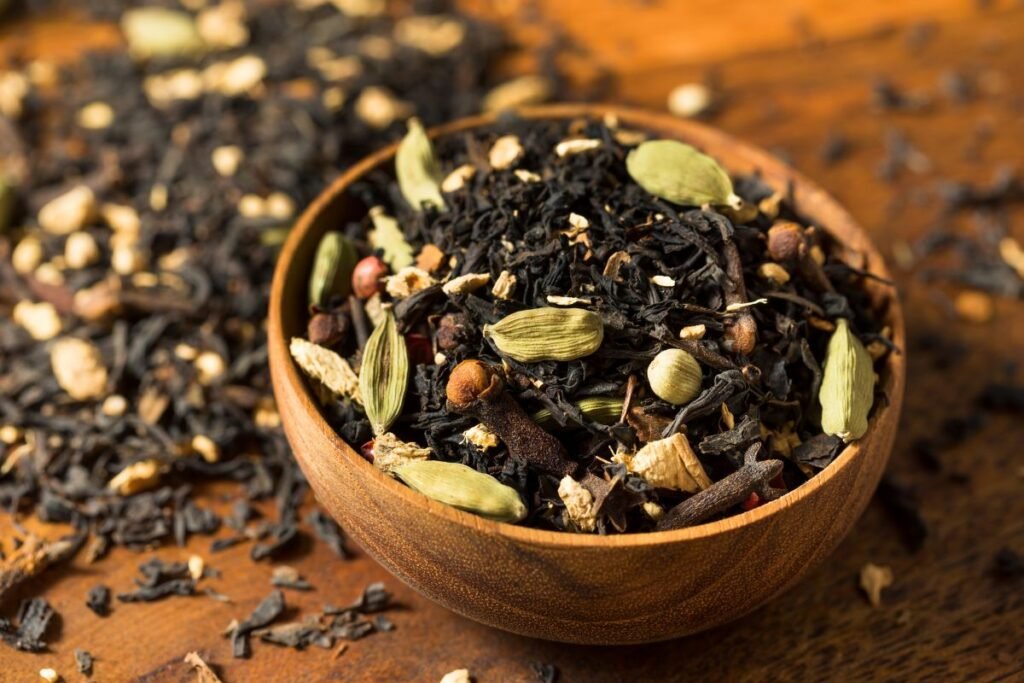
Chai Variations
Use black tea with Indian origin for the classic Chai, supplemented with Chai spices, milk, and sweetener. More recently, various combinations of Chai spices have developed to satisfy different tastes and needs. By combining different spices, you can get a variety of flavors of the usual classic Chai:
- You can add a bit of chili pepper to the traditional Chai spice mix for a warming effect and a spicier taste.
- Use apple, cinnamon, cardamom, cloves, orange slices, and pink peppers in Chai tea for a more fruity flavor. The combination of these spices is ideal for creating a Christmas mood.
- Combine the classic spices of cinnamon, cardamom, ginger root, star anise, cloves, and black pepper with South African red tea (Rooibos) to get decaffeinated Chai.
- Mix lemongrass, cinnamon, coriander, fennel, cumin, and cardamom for a more citrusy version of Chai. Choose green tea as the base.
Health Benefits of Chai Tea (Overall)
Drinking Chai is tasty and beneficial. Spices, black tea, or other types of tea have beneficial properties for the body.
Overall, the entire combination of ingredients is beneficial for boosting immunity and fighting free radical damage. However, this tea can alleviate the symptoms of particular ailments or promote treatment.
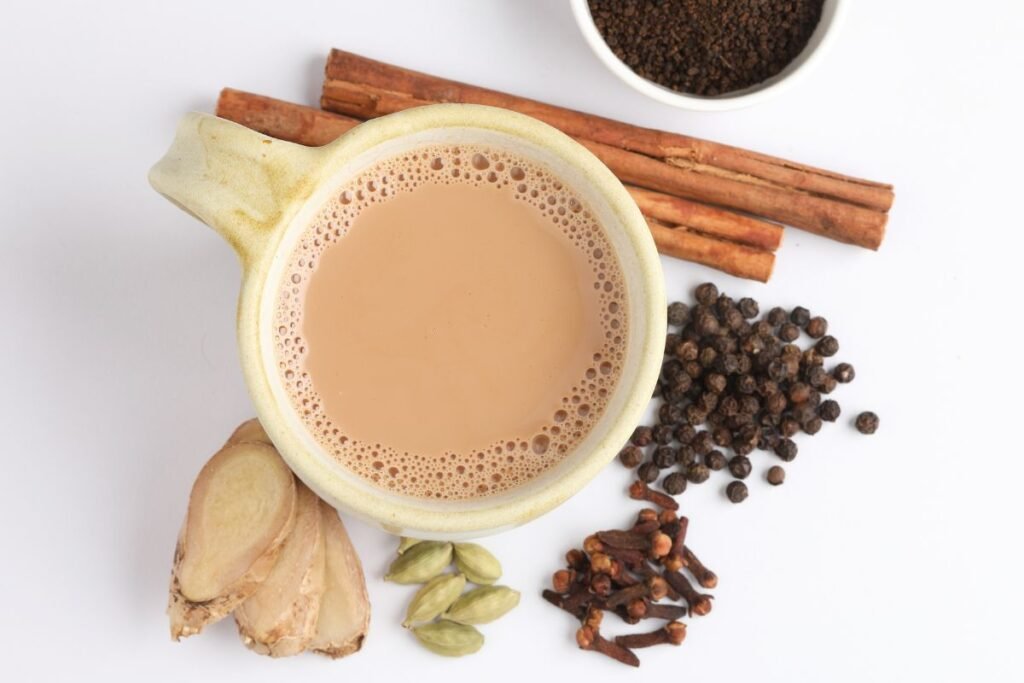
Chai Tea Benefits
- If you have a cold or a sore throat, drink classic Chai. It’s sure to make you feel better or even help you avoid a more complicated illness. Ingredients such as black tea, ginger, cinnamon, cardamom, and cloves have antimicrobial and anti-inflammatory properties needed to treat colds.
- If your body suffers from inflammation, Chai tea’s anti-inflammatory ingredients help resist it.
- Black tea, cinnamon, cardamom, and cloves contribute to heart health. The flavonoids in these spices and tea leaves strengthen blood vessels and prevent plaque on blood vessel walls. Cinnamon helps to lower blood cholesterol levels.
- The tannins in black tea benefit the digestive system. Together with ginger, it relieves symptoms of indigestion. Ginger helps with nausea. This tea relieves the symptoms of morning sickness in pregnant women.
- As black tea contains caffeine and chai spices are invigorating, drinking this tea increases energy and alertness and improves concentration.
- Chai tea can improve your cognitive function. Cinnamon and ginger are the most beneficial in this area. Black tea has a positive effect on brain function.
- A cup of fragrant and exquisitely flavored Chai tea can perfectly relax and even relieve physical muscle pain caused by tension.
Caffeine in The Chai
Chai with black tea contains caffeine. Choose blends with South African red tea (Rooibos) for decaffeinated ones, or use green tea with less caffeine.
Even classic Chai is made with black tea but less caffeinated than traditional. The reason is that it is diluted with milk and enriched with Chai spices. A cup of classic Chai tea (240 ml) contains around 25 mg of caffeine. It is half a cup of black tea or a quarter of a regular cup of coffee.
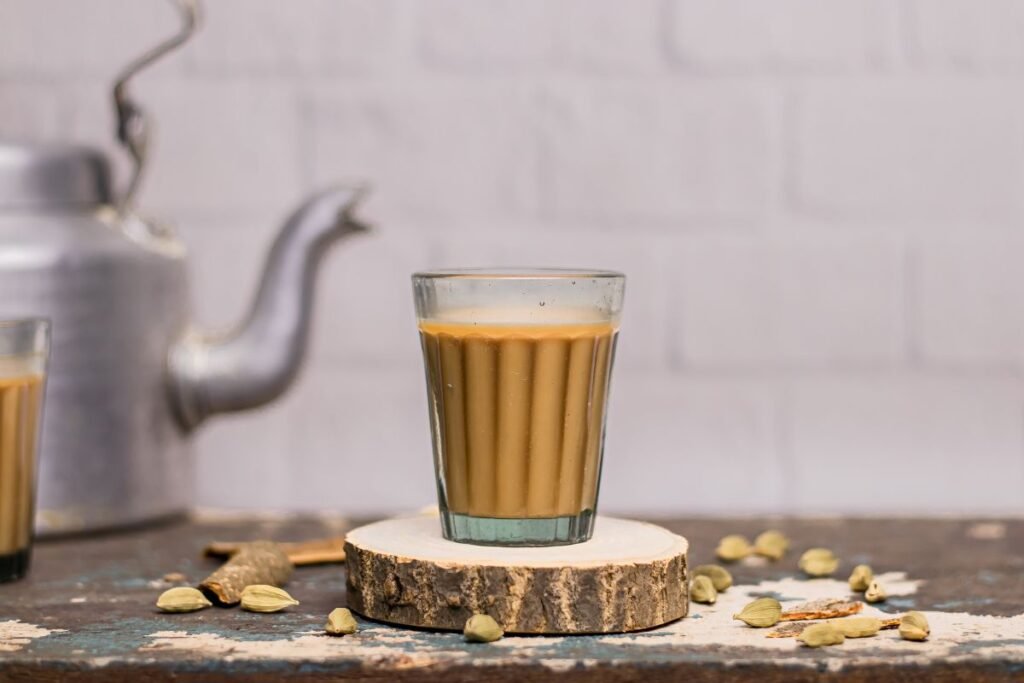
How to Make Classic Chai Tea
When making classic Chai tea, the quantity of ingredients depends on the volume, the flavor’s intensity and spiciness, and the preferred sweetness you want to brew. Therefore, the recipe below contains only the necessary ingredients, but the quantity of them you should determine yourself. However, do not use spices in excess, as the taste of the tea may be too intense.
You will need:
- black tea (preferably Indian),
- cardamom (preferably pods or seeds),
- cinnamon sticks,
- ginger root (fresh or ground),
- cloves,
- black peppercorns,
- star anise,
- nutmeg (whole),
- water,
- natural full-fat milk (you can use vegetable milk),
- your favorite sweetener (cane sugar, honey, etc.).
The spices for the tea can be whole, slightly crushed, or coarsely ground in a pepper mill. Using fresh spices in small quantities produces the best version of the tea.
The best milk for this tea is as low-fat as possible, unless you are intolerant to milk, in which case you can substitute vegetable milk. The best substitutes for plant milk are oat milk or cashew cream.
The ratio of milk to water in classic Chai should be two parts water to one part milk. But if you prefer a more milky tea, use equal parts milk and water.
Instruction:
- Crush the spices (if you want to use crushed),
- Bring water to a boil in a saucepan.
- Add the tea and spices.
- Reduce the heat to low and boil for 2 minutes.
- Pour in the milk and turn off the heat, or if you prefer a creamier consistency, bring the tea and milk to a boil and then turn off the heat.
- Strain the tea through a sieve and pour it into cups.
- Add sweetener to the cup if desired.
Tea professionals advise preparing tea in a stainless steel pot. It shouldn’t stick to the walls while you heat the tea with milk.
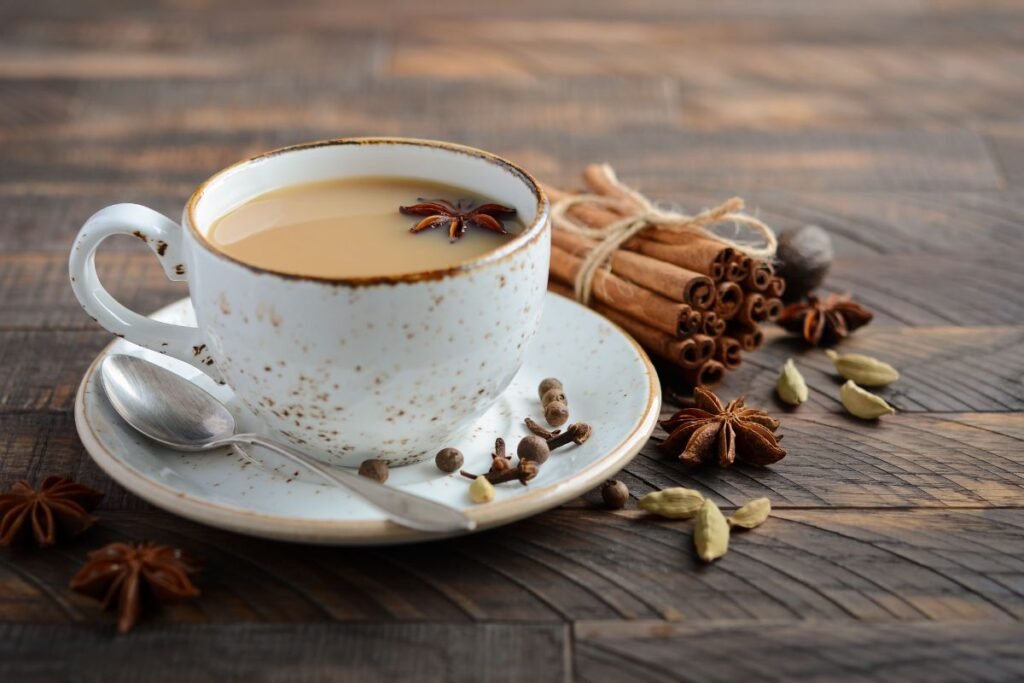
Chai Tea Concentrate
If you have more time, you can prepare Chai tea concentrate to make your favorite drink faster. To prepare approximately 0.5 liters of concentrate, you will need:
- 2.5 teaspoons of black tea,
- 20 whole black peppercorns,
- 5 pieces of cloves,
- 5 cardamom pods,
- 1 cinnamon stick,
- 1 star anise,
- about 10 cm of fresh, sliced ginger
- 2.5 glasses of water.
Preparation:
- In a dry frying pan over low heat, toast the peppercorns, cloves, cardamom, cinnamon, and star anise for about 2 minutes. When the spices begin to give off their aroma, remove the pan from the heat and leave it to cool. When the spices have cooled, grind them with a coffee or spice grinder to a coarse powder.
- Pour the water into a saucepan, add the ginger and the ground spices, and bring everything to a boil. Once boiling, simmer the mixture over low heat for 20 minutes. Most importantly, do not let it reach a boil because the spices will become bitter.
- Then add the teaspoons, turn off the heat, cover the pot, and leave it to stand for 10 minutes.
Strain the prepared Chai tea concentrate and pour it into a clean, airtight bottle. When cool, place in the refrigerator and consume within a week.
When you want a cup of Chai, take 1 part of the concentrated tea and mix it with 1 part hot water and 1 part hot milk. Sweeten if you like and enjoy. If you want to make a latte version of Chai, use 1 part concentrate and 2 parts milk.
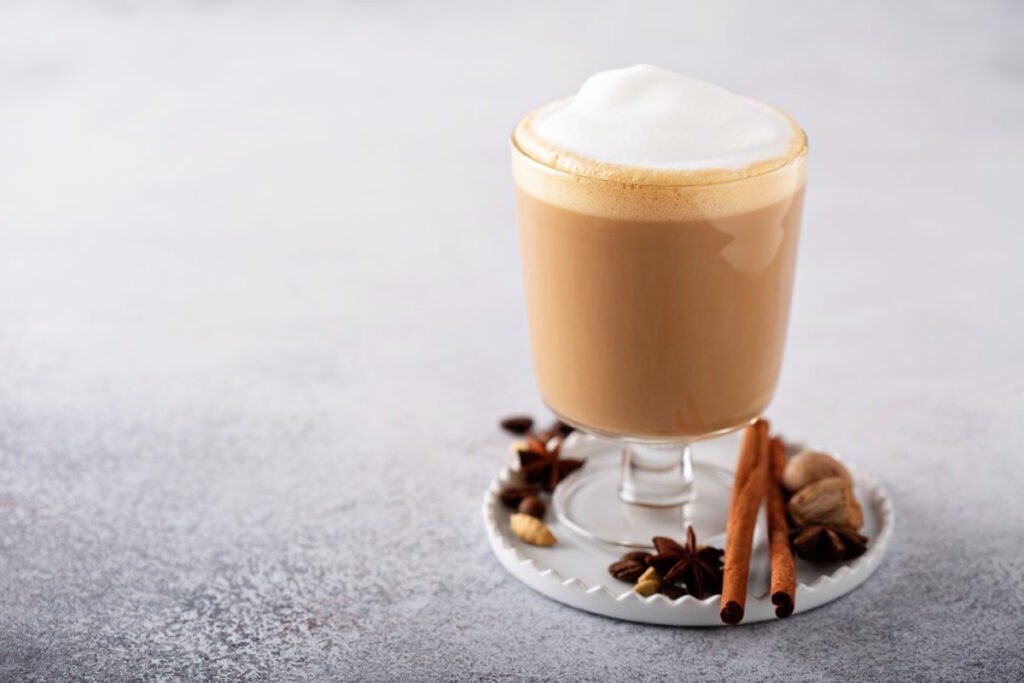
Chai Latte
Chai latte is a variant of the classic Chai tea. The main difference between a classic Chai tea and a Chai latte is that the latter is made with hot, whipped milk. Here’s how you can make it:
Put all the ingredients for Chai tea in a small saucepan over medium heat and bring to a boil. Then turn off the heat, cover it, and leave it to stand for about 10 minutes. Then strain it and pour it into cups.
Whisk the warm milk with a milk churn or electric whisk and pour it over the tea. Sweeten if desired.
Vegan Chai
The vegan Chai tea base is a classic Chai. The main difference is that this version uses plant milk. Choose a combination of ingredients to give it a little more sweetness.
For the vegan Chai tea, you will need:
- 1.5 cups of unsweetened plant milk (almond, soy, oat, coconut, etc.),
- cup of water,
- 1 teaspoon of raw black tea,
- 1 teaspoon ground cardamom (or 8 green cardamom pods),
- ½ teaspoon ground cinnamon,
- ½ teaspoon finely grated fresh ginger,
- 2 star anise,
- 2-3 cloves (or a pinch of whole fennel seeds),
- ¼ teaspoon pure vanilla extract,
- For sweetening (optional), 1 tablespoon honey or 2 tablespoons coconut sugar.
Prepare the tea in the same way as the classic Chai version. First, boil all the spices in a saucepan for about 10 minutes. Then turn off the heat, add the teas, and leave to steep for 5 minutes. Sieve the tea, pour it into a cup, and fill it with warm plant milk. Sweeten if needed. You can make the spice decoction with plant milk for a decaffeinated vegan Chai.
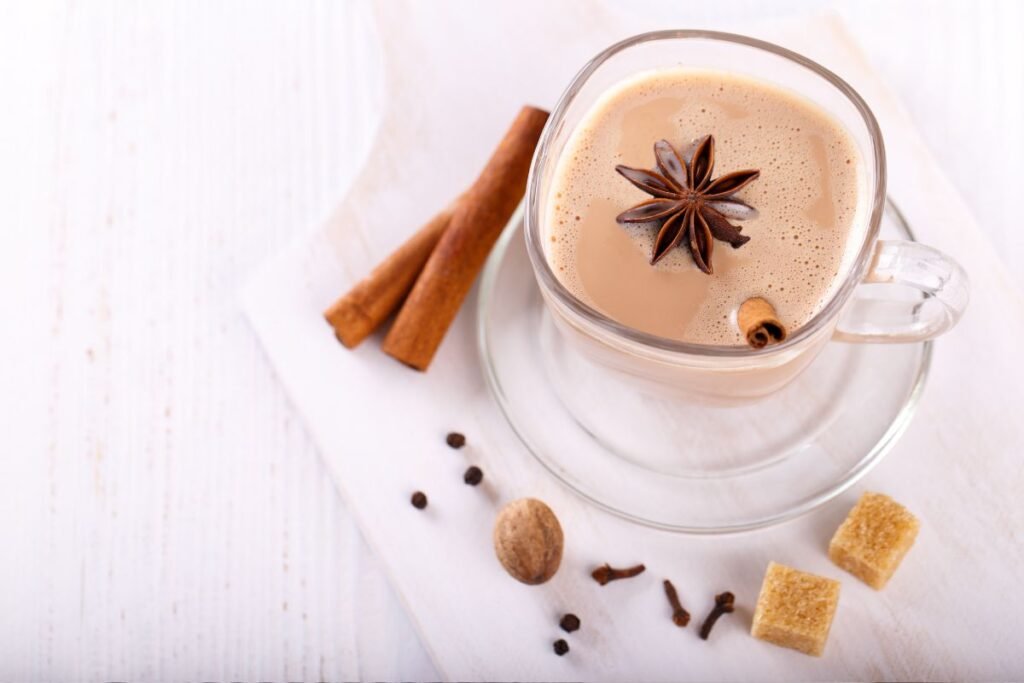
Chai Powder: The Fast Version of Tea
You can buy mass-produced Chai tea blend powder in supermarkets. Just pour hot water over it, and your tea is ready! Chai powder is a product adapted to the needs of the modern world. Many flavors have been developed, from classic Chai to fruity and exotic. Chai powder is “instant tea.” All you need to do is put a few teaspoons of Chai powder in a cup, pour hot water over it, and stir well.
Chai Tea Side Effects
The main reason why Chai tea can have undesirable effects is the caffeine it contains. Consuming too much caffeine can lead to unpleasant health problems such as anxiety, heart rhythm problems, headaches, and high blood pressure.
A maximum of 400 mg of caffeine is usually harmless for people with no health problems. Pregnant and breastfeeding women should avoid caffeine or consume more than 200 mg daily.
The ginger in chai tea may negatively affect people with low blood pressure or sugar levels. Persons taking blood thinners should also limit their intake of ginger.
Also, classic Chai is not proper for lactose-intolerant people.
Sources:
https://artfultea.com/blogs/wellness/chai-tea-benefits
https://www.healthline.com/nutrition/chai-tea
Associative photos © Canva.
